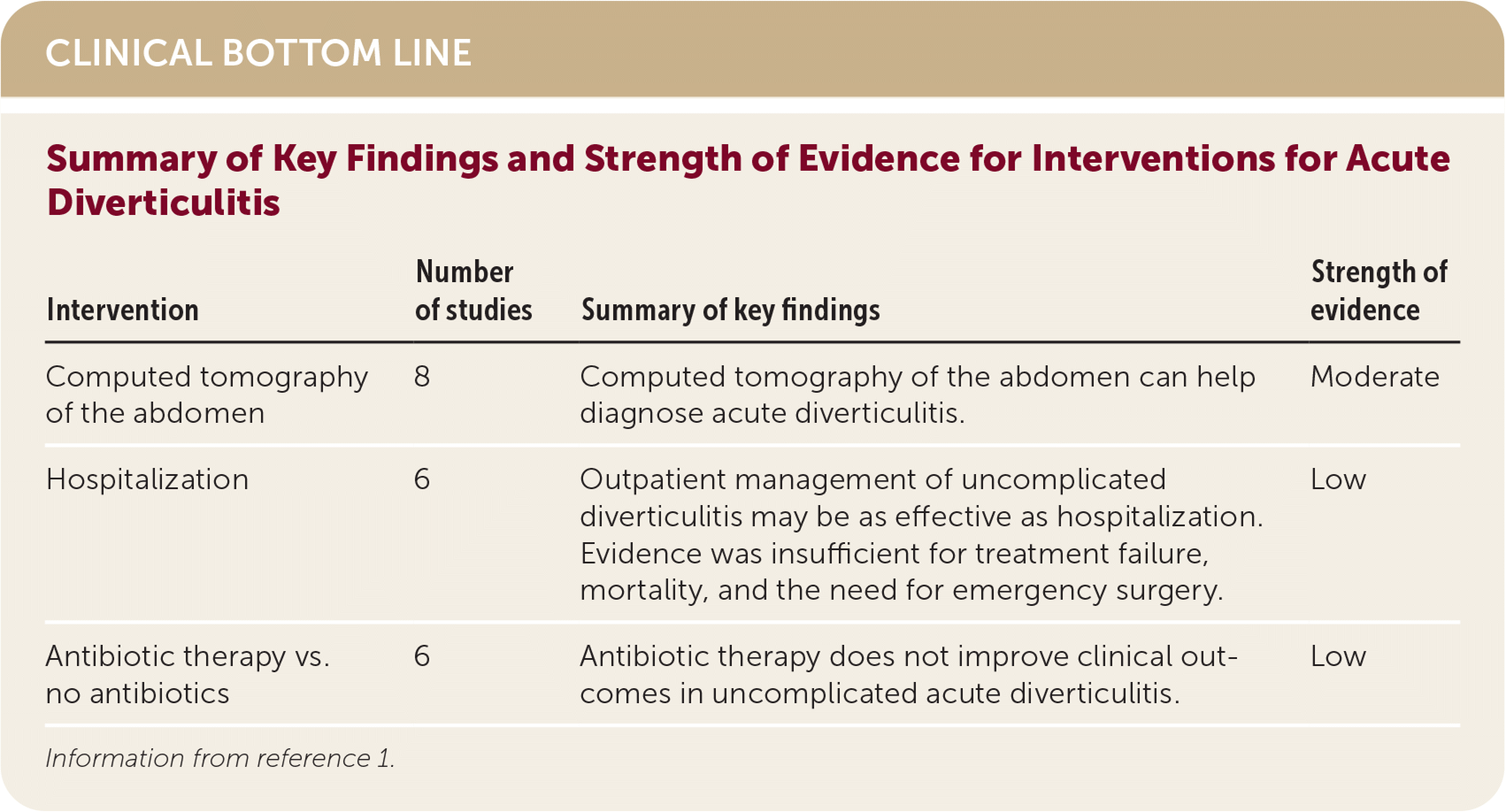
Am Fam Physician. 2021;104(2):195-197
Author disclosure: No relevant financial affiliations.
Key Clinical Issue
What are the benefits and harms of diagnostic testing, and what is the effectiveness of treatment options for acute colonic diverticulitis?
Evidence-Based Answer
Computed tomography (CT) accurately diagnoses acute diverticulitis and may make appropriate management more likely compared with clinical diagnosis alone. (Strength of Recommendation [SOR]: B, based on inconsistent or limited-quality patient-oriented evidence.) Misdiagnosis does not increase the risk of poor clinical outcomes. (SOR: B, based on inconsistent or limited-quality patient-oriented evidence.) For patients with uncomplicated acute diverticulitis, outpatient management may be as effective as inpatient care, but there is insufficient evidence regarding important clinical outcomes, including treatment failure, mortality, and emergency surgery. (SOR: C, based on disease-oriented evidence.) Antibiotic treatment for patients with uncomplicated diverticulitis does not affect pain symptoms, length of hospitalization, recurrence risk, quality of life, or need for surgery compared with no antibiotic treatment. (SOR: B, based on inconsistent or limited-quality patient-oriented evidence.) The evidence is insufficient to guide the choice of antibiotic regimen for patients who do receive antibiotics.1

| Intervention | Number of studies | Summary of key findings | Strength of evidence |
|---|---|---|---|
| Computed tomography of the abdomen | 8 | Computed tomography of the abdomen can help diagnose acute diverticulitis. | Moderate |
| Hospitalization | 6 | Outpatient management of uncomplicated diverticulitis may be as effective as hospitalization. Evidence was insufficient for treatment failure, mortality, and the need for emergency surgery. | Low |
| Antibiotic therapy vs. no antibiotics | 6 | Antibiotic therapy does not improve clinical outcomes in uncomplicated acute diverticulitis. | Low |
Practice Pointers
Colonic diverticulitis is caused by inflammation of abnormal outpouchings (diverticula) in the wall of the large intestine.1 Diverticulosis occurs in 5% to 15% of people older than 45 years and in 80% of those older than 85 years.2 For people with diverticulosis, the lifetime prevalence of developing acute diverticulitis is approximately 25%. Alterations in colonic wall resistance and motility and a low-fiber diet contribute to increased luminal pressure and bowel wall weakness. Aspirin, nonsteroidal anti-inflammatory drugs, obesity, lack of exercise, and increasing age are all risk factors for developing diverticulitis.2 Acute diverticulitis accounts for more than 2.6 million outpatient visits and 200,000 inpatient admissions each year in the United States.3 Diverticulitis can be divided into two categories, uncomplicated and complicated. Complicated diverticulitis is associated with abscess formation, fistula, and bowel obstruction or perforation and may occur in up to 15% of acute diverticulitis cases.3
This Agency for Healthcare Research and Quality (AHRQ) review included 77 primary studies and two systematic reviews on the diagnostic accuracy of CT of the abdomen; harms related to false-positives, false-negatives, and incidental findings on CT; the effectiveness and harms of hospitalization; antibiotics and radiology interventions for the management of acute diverticulitis; the need for follow-up colonoscopy in people with a history of acute diverticulitis; and the effectiveness and harms of pharmacologic and nonpharmacologic interventions and elective surgery for the prevention of recurrent diverticulitis.1
The AHRQ review found that CT of the abdomen has high sensitivity (94%) and specificity (99%) for the diagnosis of acute diverticulitis, but there was insufficient evidence to evaluate staging criteria. Misdiagnosis on CT did not increase the risk of poor clinical outcomes. Incidental findings are common on CT of the abdomen and may prompt further investigation. One study of emergent abdominal CT found that more than 60% of scans included an incidental finding.4 CT can be useful to confirm the diagnosis but is less helpful in directing management.
Adverse outcomes such as mortality and emergency surgery were uncommon (0.2% and 1.3%, respectively) regardless of management setting (inpatient vs. outpatient), and there was no evidence to suggest differences in recurrence based on setting. Evidence was insufficient to make conclusions about the effects of inpatient vs. outpatient management on treatment failure, mortality, and the need for emergency surgery.
The AHRQ review found low-quality evidence that antibiotic treatment for patients with uncomplicated diverticulitis does not improve pain, length of hospitalization, recurrence risk, or quality of life compared with no antibiotic treatment. The incidence of sigmoid resection at one month and one year is not significantly changed by the administration of antibiotics. Evidence was insufficient to recommend one antibiotic regimen over another.
The traditional approach to outpatient management of patients with acute diverticulitis consists of clinical diagnosis with or without imaging, antibiotics, and bowel rest.2,3 The AHRQ review supports recent guidelines from the American Gastroenterological Association and the American Society of Colon and Rectal Surgeons that recommend CT of the abdomen as the most appropriate diagnostic study.5,6
Although most of the evidence was considered low strength or insufficient by the AHRQ review authors, the review and the American Gastroenterological Association guidelines suggest that uncomplicated acute diverticulitis can usually be diagnosed and managed in the outpatient setting without antibiotics. Two U.S. cohort studies published after the end date of the AHRQ literature search found no differences in the effectiveness of outpatient treatment of diverticulitis with amoxicillin/clavulanate or with metronidazole plus a fluoroquinolone.7 In general, patients with complicated acute diverticulitis should be treated as inpatients and receive antibiotic therapy.
Editor's Note: AFP SOR ratings are different from the AHRQ Strength of Evidence ratings. Dr. Seehusen is an assistant medical editor for AFP.
